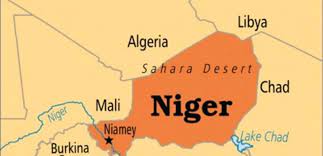The enthusiasm of traders at the border towns indicates they missed and lost a lot during the period businesses were paralyzed, due to border closure, Juliet Jacob takes an insightful look
Enthusiasm of Traders
Businessmen, especially itinerant small informal ones, on both sides of the border between Nigeria and Niger are still celebrating the decision by the Nigerian government to re – open air and land borders between Nigeria and Niger Republic.
Abu Mauruf has been trading grains at the Dawanau market, an international market that brings grains and fabrics traders from Nigeria and Niger together. He told Africa Health Report on the phone recently that “ah ha, the opening has increased trading at the market once again, our business had reduced drastically since the closure of the border”
Musa Madobi is another trader at the market. He says his fabrics business suffered low patronage following the closure. “I used to welcome a lot of buyers from Niger in my shop, but the closure kept them away”. Madobi confessed he tried to find alternative route to send wares to some of his customers in Maradi in Niger unsuccessfully during the period of the closure. “some of my friends here were sending things to Niger via motorbikes but I was afraid, after considering all the risks involved”
Opening Borders
“Opening the border will bring our customers back in no time from now” he said while pointing to a man dressed in brown caftan, “I suspect that man is from Niger to survey how the market is now, I am sure he will return to inform others of how the market is”
Trade between Nigeria and Niger have always been robust, particularly in the formal sector of power, oil and gas. In 2022, Nigeria exported $287M total exports to Niger. The main products that Nigeria exported to Niger are Electricity ($64.3M), Cement ($60.1M), and Petroleum Gas ($52.5M). During the last 27 years the exports from Nigeria to Niger have increased at an annual rate of 7.62%, from $39.5M in 1995 to $287M in 2022.
But it is trade at markets like Dawanau and the ones in Niger that embellish the robustness of the trade. In fact, it is the informal trade between both countries that underline the trade relationship between both countries.
Mass Movement
A major highpoint remains the mass movement of humans and goods that showcases the strength of this trade. Every day it is mass movement of over 500,000 individuals at the Illela – Maradi border post.
So for Madobi, Mauruf and thousands of others, the news of the reopening of the border goes beyond a ceremony but the essence of their existence.
According to the Global Initiative Against Trans – Border Organised Crime, GIATO, “cross-border trade is a vital component of Nigeria’s economy” and that of Niger Republic, “capable of offering a pathway to economic growth and development”
Welcoming the reopening of the border by the Nigerian government, GOATO maintains that “the closure of borders in 2019, though aimed at curbing smuggling and promoting local production, had significant economic repercussions”
According to it, the closure dealt a heavy blow on the informal trade sector between both countries, the kind Mauruf and Madobi depends on. “It disrupted the informal sector, which plays a crucial role in the Nigerian economy and across West Africa: it said.
The Informal Sector
In addition to all other of its negatives GIATO said the closure “led to the rising prices of several commodities” adding “For instance, in the Southern African Development Community (SADC), ICBT accounts for an estimated 30–40 percent of total intra-SADC trade, valued at approximately $17.6 billion.
In West Africa, the informal sector is pivotal, contributing around 50 percent to Benin’s GDP and 90 percent to employment. These statistics underscore the significance of cross-border trade, not only for economic integration but also for livelihoods across the region”
The closure of the border by the Nigerian government imposed the following restrictions on trade and relationship between both countries:
(1) Closure of land and air borders between Nigeria and Niger Republic, as well as ECOWAS no-fly zone on all commercial flights to and from Niger Republic.
(2) Suspension of all commercial and financial transactions between Nigeria and Niger, as well as freeze of all service transactions, including utility services and electricity to Niger Republic.
(3) Freeze of assets of the Republic of Niger in ECOWAS Central Banks and freeze of assets of the Republic of Niger, state enterprises, and parastatals in commercial banks.
(4) Suspension of Niger from all financial assistance and transactions with all financial institutions, particularly EBID and BOAD.
(5) Travel bans on government officials and their family members.



